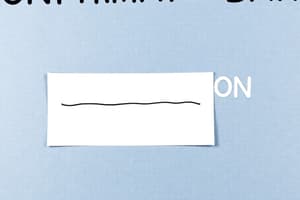Podcast
Questions and Answers
What is confirmation bias?
What is confirmation bias?
Confirmation bias occurs when people seek out or evaluate information in a way that fits with their existing thinking and preconceptions.
How is confirmation bias related to science?
How is confirmation bias related to science?
Confirmation bias in science is associated with people processing hypotheses in ways that end up confirming them, rather than advancing based on both falsifying and supporting evidence.
What is an example of confirmation bias in consumer behavior?
What is an example of confirmation bias in consumer behavior?
A consumer who likes a particular brand and researches a new purchase may be motivated to seek out customer reviews on the internet that favor that brand.
What unmotivated processes are related to confirmation bias?
What unmotivated processes are related to confirmation bias?
Name a publication that discusses confirmation bias in depth.
Name a publication that discusses confirmation bias in depth.
Flashcards are hidden until you start studying
Study Notes
Confirmation Bias
- Confirmation bias occurs when people seek out or evaluate information in a way that fits with their existing thinking and preconceptions.
- The domain of science is not immune to bias, which is often associated with people processing hypotheses in ways that end up confirming them.
- A consumer who likes a particular brand may be motivated to seek out customer reviews on the internet that favor that brand.
- Confirmation bias has also been related to unmotivated processes, including:
Primacy Effects
- Reliance on information that is encountered early in a process.
Anchoring
- Reliance on information that is encountered early in a process.
- Key research studies on confirmation bias:
Wason (1960)
- Initial study on confirmation bias.
Nickerson (1998)
- Study on confirmation bias, highlighting its ubiquity in many forms.
Oswald & Grosjean (2004)
- Study on confirmation bias in the context of science, where theories should advance based on both falsifying and supporting evidence.
Studying That Suits You
Use AI to generate personalized quizzes and flashcards to suit your learning preferences.



